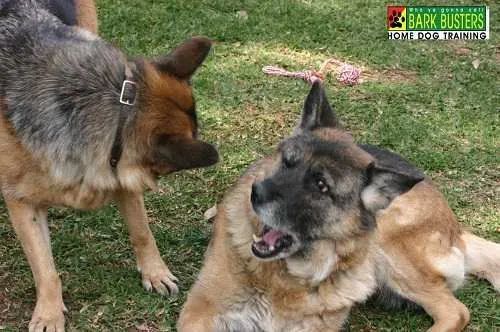Fear Aggression In Dogs

A dog who shows aggression to other dogs, or even people can be very difficult to handle. It's not surprising then that one of the main reasons for dogs being surrendered to shelters is aggression. Sadly, the prospects for a surrendered dog flagged as aggressive are not bright. Often the shelter will have no option but to euthanise the dog as they wouldn't be able to risk re-homing. Each shelter will have their own rules and regulations about this so you would need to check these out locally.
So, it is even more important with a dog showing aggression that you try everything you can to improve and/or manage the situation before you consider surrendering your dog to a possible death sentence. Here are some points to consider:
- Puppies aren't aggressive when they are born. Also, don't confuse mouthing with aggression.
- Something has happened to make your dog feel that defence against strange people or dogs is the only option, and that aggression is the only option to activate their defence. Try to establish if there was an event that started the aggression, or is this behaviour something that has come on gradually?
- Confident dogs are rarely aggressive. It is the nervous or timid dogs who are more likely to show aggression.
- When you feel nervous about your dog's potential behaviour, your dog will sense this and become more alert, adrenalised and more likely to show aggression.
One of the founding principles of our training is that you should show leadership and be a leader so that your dog can respect and trust your decisions. Dogs who show aggression are often nervous dogs who can take on a role as "Head of Security". They feel responsible for the safety, not only of themselves, but of you and the rest of the household. They will often be stressed out by the responsibility they have resting on their shoulders, and so will be permanently on edge, adrenalised and on the alert for trouble. The spike in adrenalin whenever a situation arises, that causes them fear (like a visitor to your home), can result in aggressive behaviour.
If your dog spends all day guarding the house by sitting on the back of the sofa, barks at noises outside or everything passing the window, charges at the front door when the postman comes, or when somebody rings the bell, chances are you have a self-appointed "Head of Security" on your hands. They will need to be sacked/demoted/made redundant/redeployed, and you will need to show them that you are in control of the security (and everything else, in fact), and that they can relax in the knowledge that you can look after yourself and them so that they can relax and just be a dog. Look at putting some training into place so that, when your dog feels fearful, instead of going into "attack" mode, they can focus on you and depend on you, knowing that you are capable of keeping you both safe.
Other things that you can do include:
- Use a muzzle, especially when out and about. That way you can relax more in the knowledge that your dog can't do any serious damage. The more relaxed you are, the more relaxed your dog will be. See our article on muzzle training your dog.
- Interact with your dog and train thiem to focus on you whatever the distraction. Start in the home and garden using food and/or toys as distractions whilst keeping their focus onto you.
- Check out the food you are feeding. Some dog foods can contain high levels of carbohydrates and additives and preservatives which can cause a dog to be over-adrenalised.
- Work on your lead walking. Train your dog to walk beside you or slightly behind you and not out in front. An adrenalised dog should not be out at the front making the decisions. They should be following you, confident in the knowledge that you are making good decisions for both of you.
We always say there is no magic wand, especially when it comes to aggression. However, with patience and perseverance, many dogs can be rehabilitated to become acceptable members of society. Some dogs may never be party animals and accept other dogs or people, so don't force them. Accept that it is better for your dog to focus on you and move past other dogs, or that they would rather sit in their crate when visitors call. Don't be afraid to call in a professional to help you if you want more help. Your local Bark Busters trainer will be happy to help.
Recent Articles
- 🐾 How Do I Know If My Dog Has Separation Anxiety? Causes, Symptoms & Training Tips
- Why Is My Dog Barking So Much? Understanding Excessive Barking and How To Help
- Dogs need education too!
- Winter woes? A dog-lovers guide to solving winter blues
- Natural Dog Behaviours
- Indoor Boredom Busters for Your Dog
- The Importance of Dog Training
- You Can Prevent Dog Bites
- Lead Training
- The Truth About Those Dog Myths
